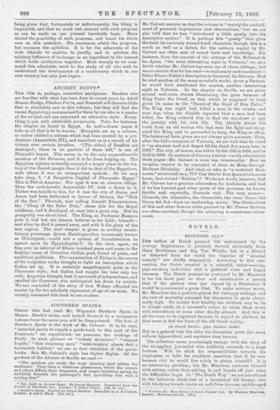ANCIENT EGYPT.*
THE, title is, perhaps, somewhat ambiguous. Readers who are familiar with what has been done in recent years by Adolf Erman, Budge, Flinders Petrie, and Breasted will discover little that is absolutely new in this volume; but they will find the recent Egyptology summarised for them by one who is a master of his subject and can command an attractive style. Every- thing is put with admirable perspicuity. Take, for instance, the chapter on Israel in Egypt. In half-a-dozen pages it tells us all that is to be known. Meneptah set up a column, or rather utilised a column which had been erected by a pre- decessor (Amenothes III.), and inscribed on it a record of his victory over certain invaders. " [The cities] of Israelon are destroyed; there is no particle of them left," is one of Pharaoh's boasts. This seems to be the only unquestionable mention of the Hebrews, and it is far from helping us. The Egyptian sojourn naturally occupied a larger place in the his- tory of the Jewish people than it did in that of the Egyptians, with whom it was an unimportant episode. Or we may take chap. 7, "A Forgotten Capital of Pharaonic Egypt." This is Tell-el-Amarnst. For ages it was an obscure village. Then the arch-heretic AmenOthes IV. took a fancy to it. Thebes was hostile-to him, for it was the city of Amon, and Anion had been dethroned in favour of Atonou, the "Disk of the Sun." Pharaoh, now calling himself Khouniatonou, the " Glory of the Solar Disk," chose this for the Royal residence, and it developed at once into a great city, But its prosperity was short-lived. The King, as Professor Maspero puts it, bad but one sincere believer in his faith—himself- and when he died it passed away, and with it the glory of the new capital. The next chapter is given to another revolu- tionary personage, Queen Hatshopsoutton (commonly known as Hatsbepsut,—could not a system of transliteration be agreed upon by Egyptologists P) In the next, again, we leap over an interval of fifteen hundred years and come to the familiar name of Cornelius Gallus, poet, friend of poets, and ambitious politician. The examination of Piffle° in the course of the irrigation works brought to light an inscription which Gallus set up. It is certainly magniloquent, quite in the Pharaonic style ; but Gallus had caught the tone only too well; Augustus thought that it savoured of independence, and recalled the Governor, who anticipated his doom by suicide. We are reminded of the story of how Wolsey offended his master by the too scholarly expression of ego et rex meue. We warmly commend this book to our readers.









































 Previous page
Previous page